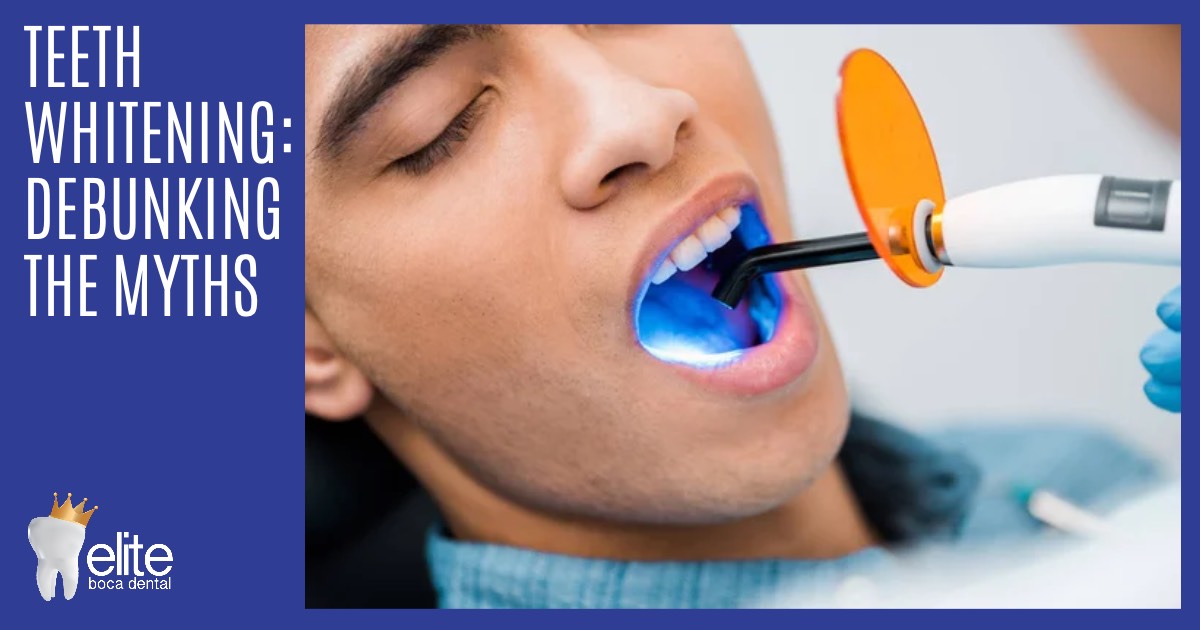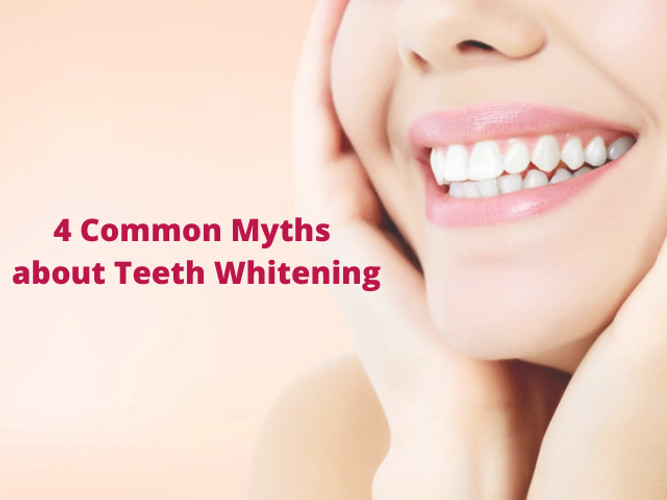Teeth Whitening Myths Debunked: What Really Works
You’ve probably heard countless tales of teeth whitening miracles, from magical toothpaste that promises a radiant smile to DIY remedies that claim to transform your teeth overnight. But before you jump on the bandwagon of these popular myths, it’s time to separate fact from fiction.
In this discussion, we’ll debunk common teeth whitening misconceptions and reveal what truly works in achieving a brighter, more confident smile. Prepare to be surprised as we uncover the truth behind these widespread beliefs, and discover the real secrets to achieving a dazzling set of pearly whites.
Myth: Whitening Toothpaste Is the Most Effective Solution
Contrary to popular belief, whitening toothpaste isn’t the most effective solution for achieving a brighter smile. While many people turn to whitening toothpaste in the hopes of getting rid of stains and discoloration, the truth is that these toothpastes can only do so much.
Whitening toothpaste works by using abrasive particles to remove surface stains on your teeth. However, these particles aren’t strong enough to penetrate the enamel and remove deep-set stains. As a result, the effects of whitening toothpaste are often minimal and temporary.
If you’re looking for a more effective solution, professional teeth whitening treatments are your best bet. These treatments use powerful bleaching agents that can penetrate the enamel and break down the molecules that cause discoloration. This leads to a more noticeable and longer-lasting whitening effect.
In addition to professional treatments, there are also at-home whitening kits that can provide good results. These kits typically use a whitening gel and custom-fitted trays to deliver the bleaching agent to your teeth. While they may not be as powerful as professional treatments, they can still help you achieve a brighter smile.
Myth: DIY Home Remedies Guarantee a Brighter Smile
If you’re not seeing the desired results with whitening toothpaste or professional treatments, you may be tempted to try DIY home remedies for a brighter smile. However, it’s important to debunk the myth that these remedies guarantee a whiter smile. While there are many DIY methods circulating online, such as using baking soda, hydrogen peroxide, or lemon juice, their effectiveness is questionable and they can even be harmful to your teeth.
One popular DIY method involves brushing your teeth with baking soda. While baking soda can help remove surface stains, it’s abrasive and can damage the enamel with prolonged use. Similarly, using hydrogen peroxide can lead to tooth sensitivity and irritation of the gums if not used properly. Lemon juice is highly acidic and can erode the enamel, making your teeth more susceptible to stains.
It’s important to remember that DIY home remedies lack the professional expertise and guidance that dentists provide. Teeth whitening is a complex process that requires careful consideration of factors such as the condition of your teeth, the cause of discoloration, and the appropriate treatment options. By consulting with a dental professional, you can ensure that you’re using safe and effective methods to achieve a brighter smile.
Myth: Whitening Treatments Damage Tooth Enamel
Whitening treatments don’t damage tooth enamel when used correctly and under the guidance of a dental professional. Contrary to popular belief, these treatments are safe and effective in brightening your smile. Here are some key points to consider:
– Professional supervision: It’s crucial to consult a dental professional before undergoing any whitening treatment. They’ll assess the condition of your teeth and recommend the most suitable method, ensuring the safety of your enamel.
– Customized approach: Dental professionals tailor the treatment to your specific needs, taking into account factors such as tooth sensitivity and existing dental restorations. This personalized approach minimizes the risk of enamel damage.
– Controlled bleaching agents: Whitening treatments employ bleaching agents like hydrogen peroxide or carbamide peroxide. When used in the correct concentration and for the recommended duration, these agents don’t harm tooth enamel.
– Protective measures: Dental professionals use protective barriers, such as dental dams or gel barriers, to shield your gums and other soft tissues from the whitening agents. This further prevents any potential damage to the enamel.
– Post-treatment care: Following the instructions provided by your dental professional after the treatment is crucial. Maintaining good oral hygiene practices and avoiding foods and drinks that may stain your teeth will help preserve your newly whitened smile.
Myth: Professional Teeth Whitening Is Only for Celebrities
Professional teeth whitening isn’t exclusive to celebrities. Many people mistakenly believe that professional teeth whitening treatments are only accessible to the rich and famous. However, this is far from the truth.
In fact, professional teeth whitening is becoming increasingly popular and affordable for people from all walks of life.
Gone are the days when teeth whitening was a luxury reserved for those in the spotlight. With advancements in dental technology and increased competition in the market, professional teeth whitening treatments have become more accessible and affordable than ever before.
Dentists now offer a range of options to suit different budgets and needs, making it possible for anyone to achieve a brighter, whiter smile.
Furthermore, professional teeth whitening treatments are often more effective and safer than over-the-counter products. Dentists have access to stronger whitening agents and can tailor the treatment to your specific needs.
They also have the expertise to ensure that the whitening process is done correctly, minimizing the risk of sensitivity or damage to your teeth and gums.
Myth: Once Whitened, Teeth Stay White Forever
While professional teeth whitening treatments have become more accessible and affordable, it’s important to debunk the myth that once teeth are whitened, they stay white forever. Although these treatments can effectively remove stains and lighten the color of your teeth, it’s crucial to understand that maintaining the results requires consistent effort and care.
Here are a few reasons why teeth don’t stay white forever:
– Dietary choices: Consuming foods and beverages that are highly pigmented, such as coffee, tea, red wine, and berries, can gradually stain your teeth over time, undoing the whitening effects.
– Tobacco use: Smoking or chewing tobacco not only poses serious health risks but also leads to persistent teeth discoloration, making it difficult to maintain a white smile.
– Aging process: As we age, the outer layer of our teeth, called enamel, naturally wears down, revealing the yellowish dentin underneath. This can make teeth appear less white and require touch-ups or maintenance treatments.
– Oral hygiene habits: Neglecting proper oral hygiene, like brushing and flossing regularly, can allow plaque and tartar to build up, leading to yellowing and staining of teeth.
– Genetics and medications: Some individuals may have naturally darker tooth enamel, making it harder to achieve and maintain a bright white smile. Additionally, certain medications can cause tooth discoloration.
Understanding these factors and adopting good oral hygiene practices can help you prolong the effects of teeth whitening treatments and enjoy a brighter smile for a longer time.
Frequently Asked Questions
Are There Any Side Effects of Using Whitening Toothpaste?
Using whitening toothpaste can have side effects. It’s important to note that most whitening toothpastes contain abrasive particles that can wear down your enamel over time. This can make your teeth more sensitive and prone to cavities.
Additionally, some people may experience gum irritation or increased tooth sensitivity after using whitening toothpaste.
It’s always a good idea to consult with your dentist before starting any whitening regimen to ensure it’s safe for you.
What Are Some Common DIY Home Remedies for Teeth Whitening?
If you’re looking for some DIY home remedies for teeth whitening, there are a few options you can try.
One popular method is using baking soda and hydrogen peroxide to create a paste, which you can then brush your teeth with.
Another option is rubbing a mixture of lemon juice and salt onto your teeth.
However, it’s important to note that these methods may not be as effective as professional treatments, and they can also be abrasive to your enamel if used too often.
How Long Do the Effects of Whitening Treatments Last?
The effects of whitening treatments can vary depending on various factors. Factors such as your oral hygiene routine, diet, and lifestyle choices can affect how long the effects last.
On average, the effects of whitening treatments can last anywhere from a few months to a year. However, it’s important to note that regular maintenance and touch-ups may be needed to maintain the desired level of whiteness.
Consulting with a dentist can help determine the best course of action for maintaining your white smile.
Is Professional Teeth Whitening Expensive?
Professional teeth whitening can be expensive, but it’s worth considering the benefits. The cost can vary depending on the location and the dentist you choose.
However, professional treatments often provide more effective and longer-lasting results compared to over-the-counter products. Additionally, dentists can tailor the whitening process to your specific needs, ensuring safety and optimal results.

Remember to consult with your dentist to discuss the options and find a solution that fits your budget.
Can Teeth Become Stained Again After They Have Been Whitened?
Yes, teeth can become stained again after they’ve been whitened. This is because certain foods and drinks, like coffee and red wine, can cause stains to develop over time.
Additionally, poor oral hygiene habits and smoking can also contribute to the re-staining of teeth.
To maintain a white smile, it’s important to brush and floss regularly, avoid staining substances, and visit your dentist for regular cleanings and touch-ups if necessary.
Conclusion
In conclusion, it’s important to separate fact from fiction when it comes to teeth whitening. Whitening toothpaste may not be the most effective solution, and DIY home remedies may not guarantee a brighter smile.
Contrary to popular belief, whitening treatments don’t damage tooth enamel, and professional te more info here eth whitening isn’t just for celebrities.
Lastly, it’s important to remember that once teeth are whitened, they may not stay white forever.
Was this helpful?

Welcome to my website! I am Levi Halpern, a dedicated and passionate professional Cosmetic Dentist with extensive experience in Orthodontic Innovations, Periodontal Care, and Pediatric Dental Care. I am thrilled to have the opportunity to share my knowledge and expertise with you.

